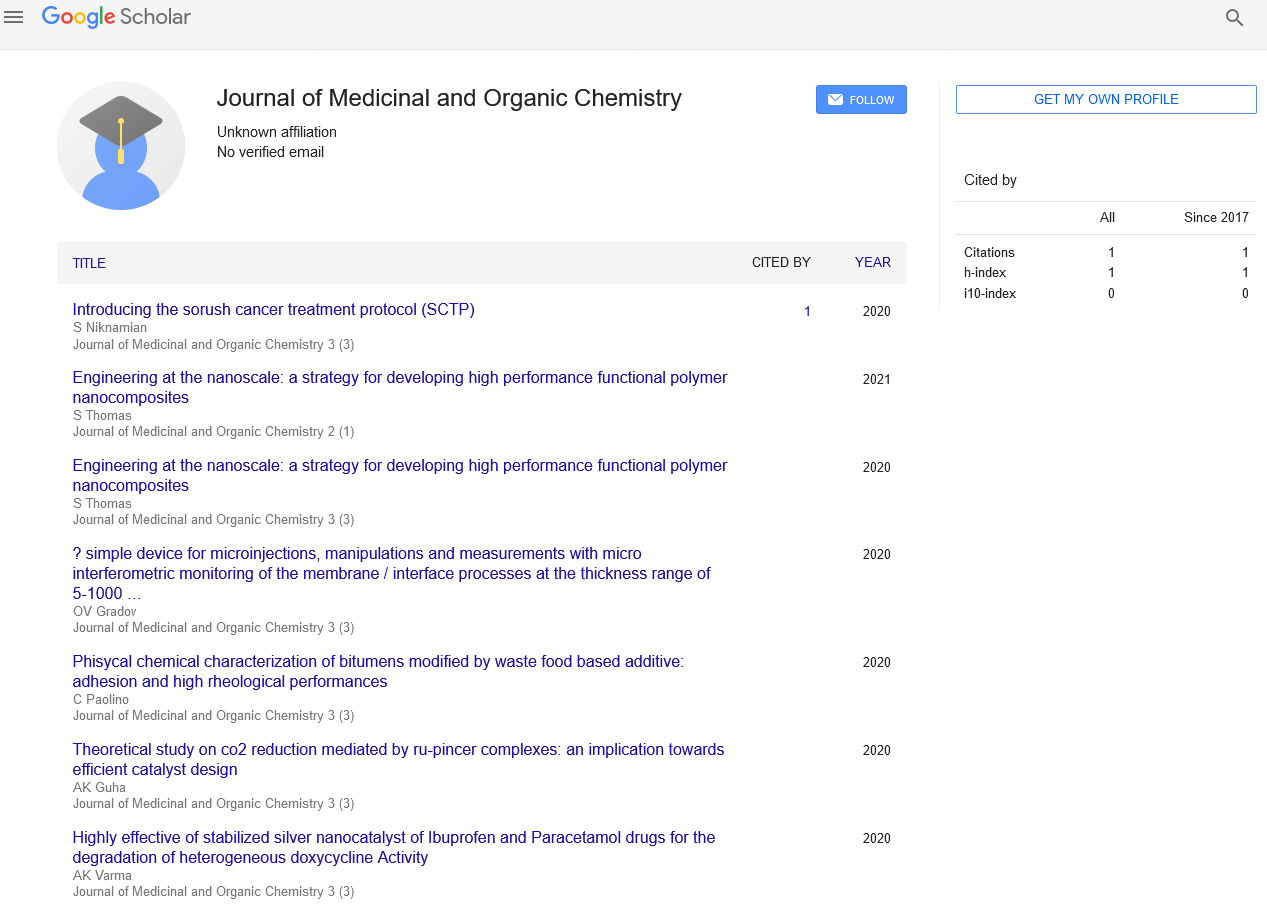Perspective - Journal of Medicinal and Organic Chemistry (2023) Volume 6, Issue 5
Genetics: Decoding the Blueprint of Life Tomorrow
- Corresponding Author:
- Oberto Jacque
Department of Physiology,
Monalisha University,
Clayton,
Australia
E-mail: jacquoberto@gmail.com
Received: 15-Sep-2023, Manuscript No. JMOC-23-118852; Editor assigned: 20-Sep-2023, PreQC No. JMOC-23-118852 (PQ); Reviewed: 04-Oct-2023, QC No. JMOC-23-118852; Revised: 19-Oct-2023, Manuscript No. JMOC-23-118852 (R); Published: 27-Oct-2023, DOI: 10.37532/jmoc.2023.6(5).121-122
Introduction
Genetics, the study of heredity and the role of genes in shaping living organisms, has been a fascinating and transformative field of science for over a century. From the pioneering work of Gregor Mendel to the revolutionary advances in modern genetic research, this discipline has offered profound insights into the fundamental mechanisms of life. In this we will explore the key concepts, historical milestones, applications, and ethical considerations surrounding genetics.
Description
Understanding genetics
Genetics is the branch of biology that focuses on the study of genes, which are the units of heredity responsible for passing on traits from one generation to the next. Genes are segments of DNA (Deoxyribonucleic Acid) located on chromosomes, which are found within the nucleus of every cell. DNA is a double-stranded molecule made up of nucleotides, each containing a sugar, a phosphate group, and one of four nitrogenous bases: Adenine (A), Thymine (T), Cytosine (C) and Guanine (G).
The genetic code is a specific sequence of these nitrogenous bases, with the sequence serving as instructions for the synthesis of proteins. Proteins are essential molecules in living organisms, performing a wide range of functions, from catalyzing biochemical reactions to providing structural support.
Historical milestones in genetics
Mendel’s experiments with pea plants laid the foundation for the understanding of inheritance patterns. He formulated the laws of inheritance, demonstrating the concept of dominant and recessive traits.
Chromosomal theory of inheritance: The work of Walter Sutton and Theodor Boveri proposed that genes are located on chromosomes, supporting Mendel’s ideas. This theory revolutionized genetics by connecting the cellular and hereditary aspects of inheritance.
Discovery of the DNA structure: James Watson and Francis Crick’s discovery of the double helix structure of DNA is one of the most significant breakthroughs in biology. This revelation provided insights into how genetic information is stored and transmitted.
Development of Polymerase Chain Reaction (PCR): Kary Mullis’ invention of PCR in 1983 allowed the amplification of DNA segments, enabling various applications in molecular biology, including DNA sequencing, genetic testing, and forensic analysis.
The human genome project: This international effort aimed to sequence the entire human genome. The successful completion of this project provided a comprehensive reference for human genetics and opened doors to personalized medicine.
Key concepts in genetics
Genetic inheritance: Genetics explains how traits are passed from one generation to the next.
It involves the transmission of genetic material from parents to offspring through reproductive cells (sperm and egg).
Genotype and phenotype: Genotype refers to an organism’s genetic makeup, while phenotype represents the observable traits that result from the interaction between an individual’s genotype and the environment.
Mendelian genetics: Mendel’s laws of inheritance describe the transmission of traits from one generation to the next, including the principles of dominance, segregation and independent assortment.
Genetic variation: Genetic variation occurs due to mutations, recombination, and other genetic processes. This diversity is essential for adaptation and evolution.
Polygenic inheritance: Many traits, such as height and skin color, are controlled by multiple genes. Polygenic inheritance involves the combined effects of multiple genes on a single trait.
Applications of genetics
Genetics has far-reaching applications in various fields, impacting both our understanding of life and practical aspects of society. Some key applications include:
Medicine: Genetic testing and counseling help identify and manage genetic diseases, assess disease risk, and personalize treatment plans. Pharmacogenomics tailors drug prescriptions to an individual’s genetic makeup.
Agriculture: Genetic engineering has led to the development of Genetically Modified (GM) crops, increasing crop yields and resistance to pests and diseases. This technology has the potential to address food security challenges.
Evolutionary biology: Genetics plays a fundamental role in understanding the mechanisms of evolution. It helps researchers trace the evolutionary history of species and study adaptation to changing environments.
Biotechnology: Genetic engineering techniques are used to produce pharmaceuticals, biofuels, and enzymes. Recombinant DNA technology has transformed the production of valuable biological products.
Personalized medicine: Genetic information can be used to tailor medical treatment to an individual’s genetic profile, improving treatment efficacy and minimizing adverse reactions.
Ethical considerations in genetics
As genetics advances, ethical considerations become increasingly critical. Some of the ethical issues surrounding genetics include:
Genetic discrimination: Concerns arise about how genetic information may be used to discriminate against individuals in areas such as employment and insurance.
Privacy: The storage and sharing of genetic information raise questions about individual privacy and the potential for misuse.
Gene editing: Emerging technologies like CRISPR-Cas9 raise ethical questions about the potential for altering the human germline and the consequences of unintended genetic modifications.
The future of genetics
The future of genetics is promising, with ongoing developments that hold potential for major breakthroughs:
Precision medicine: Advances in genetics will continue to drive personalized medicine, tailoring treatment to an individual’s genetic makeup.
Synthetic biology: Genetic engineering will enable the creation of entirely synthetic organisms and the design of novel biological systems for diverse applications.
Genomic medicine: Genomic data will become increasingly integrated into medical practice, influencing disease prevention, diagnosis, and treatment.
Evolutionary genomics: A better understanding of the genetics of evolution will shed light on the adaptation of species to changing environments.
Conclusion
Genetics, as the science of heredity and the study of genes, is a remarkable and ever-evolving field. From its historical milestones to its contemporary applications, genetics has profoundly shaped our understanding of life and paved the way for advancements in medicine, agriculture, forensics, and biotechnology. As the field continues to advance, we must remain mindful of the ethical considerations surrounding genetics, ensuring that the power of genetic knowledge is harnessed responsibly and for the benefit of all. The future of genetics promises further breakthroughs, with the potential.

